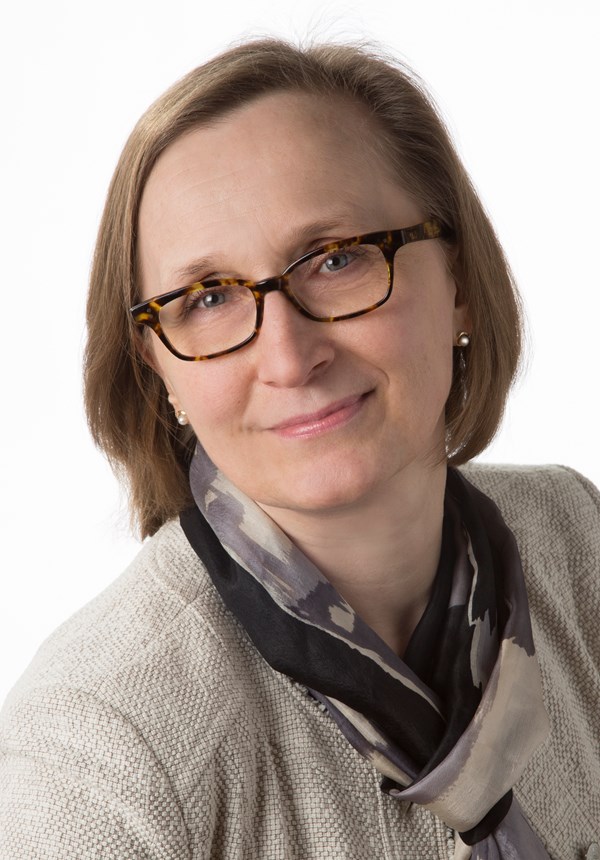Folkhälsan Research Center
One of the main fields of focus at Folkhälsan is scientific research. The Folkhälsan Research Center, responsible for Folkhälsan’s research activities, is an internationally renowned unit with focus on biomedical and health research within programs on genetics and public health.
The Center operates in Biomedicum Helsinki in the medical campus of the University of Helsinki and in Folkhälsan’s main building near the medical campus. The Center accommodates a staff of approximately 200. The total funding for 2023 was 9.7 million euros, of which external financing accounted for 45 percent. Read our Annual Report here.

Administration
The Board of the Research Center is responsible for coordinating the overall activities within the Center.
Board Members:
Tom Böhling (Chair)
Christel Gripenberg-Lerche (Vice Chair)
Kristian Wahlbeck
Niklas Talling
Secretary: Michael von Boguslawski
Presenter: Anna-Elina Lehesjoki
Presence right:
Johan Eriksson
Siv Sandberg
The Operational Board of the Center supports the Director of the Center in coordinating the research programs and in promoting their collaboration.
Board Members:
Anna-Elina-Lehesjoki (Chair)
Michael von Boguslawski
Outi Elomaa
Johan Eriksson
Markku Lehto
Eva Roos
Niina Sandholm
Marco Savarese
Heli Viljakainen
Jaana Welin-Haapamäki (Secretary)
Presence right:
Heidi Furu
Folkhälsan Research Center is part of Samfundet Folkhälsan i svenska Finland rf. The Research Center is financed partly by Samfundet Folkhälsan's own funds and support from the Folkhälsan Research Foundation, and partly by external grants.
Director: Anna-Elina Lehesjoki
Administrative Manager: Michael von Boguslawski
Compliance Expert: Outi Elomaa
Science Communicator: Heidi Furu
Executive Assistant: Jaana Welin-Haapamäki
Planner: Carina Brandstetter
Financial Manager: Nina Forss
Economic Administrator: Sebastian Oey
Director: Markku Lehto
Laboratory Manager: Ann-Liz Träskelin
Read more
Ossian Schauman, one of the founders and the first chairman of Folkhälsan, and his wife Betsy left in their will almost their entire property to "establish and maintain a Swedish institute for theoretical and applied genetic research". The Folkhälsan Institute of Genetics was founded in 1962. The first two decades it operated in close cooperation with the Medical Research Institute Minerva, later also with the Department of Medical Genetics of the University of Helsinki.
In 1990s Folkhälsan decided to broaden its research activities to encompass also public health related research. The Folkhälsan Research Centre was founded in 1994, and in 1997 the Center moved to its own premises in the Folkhälsan Senior House at Mannerheimintie 97. Since 2001 the major part of the Center has been located in Biomedicum Helsinki. The genetic research and the administration of the Research Center are located in the Biomedicum.
The public health research teams work in Folkhälsan main building, Topeliuksenkatu 20, Helsinki.
The Center has close collaboration with the University of Helsinki, which is based on a mutual cooperation agreement since 1996. Many of the Group Leaders in the Center are professors at the University of Helsinki. Five research groups are affiliated with the Research Programs of the Medical Faculty, University of Helsinki for the period 2019-2025: Groups Groop, Mäkitie and Tuomi within the Clinical and Molecular Metabolism Research Program and Groups Kere, and Kallijärvi within the Stem Cells and Metabolism Research Program. Anna-Elina Lehesjoki and Hannes Lohi work as HiLIFE Fellows at the Helsinki Institute of Life Science (HiLIFE) at the University of Helsinki in 2017–2020.
2024
Viivi Saari: Growth, puberty, gynecological health, and fertility in women with APECED. 2024.
Cedric Korpijaakko: Cardiometabolic health and morbidity in offspring of women with type 1 diabetes. 2024.
2023
Joonatan Borchers: Primary adrenal insufficiency: epidemiological aspects and associating features in APECED. 2023.
Perttu Liuska: Myocilin and the genetics of open-angle glaucoma in Finland. 2023.
Jenny Wadén: sRAGE and genetic variations at the HLA locus in type 1 diabetes, its complications, and mortality. 2023.
Niina-Maria Nissinen: Secondary disabilities in Finnish youth with prenatal substance exposure. 2023.
Mari Laakso: Flourishing students and families – Enhancing well-being of adolescents and families through positive psychology interventions. 2023.
Maria Enlund-Cerullo: Vitamin D metabolism in early childhood; associations with genetic variants and biomarkers. 2023.
Eduard Daura Sarroca: Role of cystatin B in the regulation of histone H3 tail proteolysis in the mouse brain : study on the molecular mechanisms of progressive myoclonus epilepsy type 1. 2023.
Riikka Pajulahti: Individual perspective on the world of food: Studies on temperament, food environment, and diet among children. 2023.
Elina Tuovinen: Phenotypic and mechanistic clues to inborn errors of immunity. 2023.
Mia Eriksson: Melancholia or Not; The Mysterious Differences in Depression: A Study of Pathophysiological Differences Between Depressive Subtypes – Findings from The Helsinki Birth Cohort Study. 2023
Sini Sulkama: Risk factors of canine ADHD-like and repetitive behaviour. 2023
2022
Marjo Nuottamo: Migraine with aura – genetic susceptibility variants. 2022
Emma Dahlström: Obesity and complications in type 1 diabetes – a genetic and clinical perspective. 2022
Lydia Sagath: Copy number variants in genes causing neuromuscular disorders. 2022
Claudia Ottka: Metabolomics in canine physiology and pathophysiology: A nuclear magnetic resonance (NMR) spectroscopy method for dogs. 2022
Fanny Jansson Siegfrieds: Incidence, progression, and regression of diabetic kidney disease in type 1 diabetes. 2022
Julia Niskanen: The genetic background of five canine models of rare human disease. 2022
Sohvi Lommi: Sweet treat consumption in school-aged children - Relationships to excess weight, dental caries and saliva microbiota. 2022
2021
Petra Loid: Genetic determinants of severe childhood-onset obesity. 2021
Stefanie Hägg-Holmberg: Incidence, risk factors, and prognosis of stroke in people with type 1 diabetes. 2021
Nicolae Mircea Panduru: Urinary biomarkers for the prediction of diabetic nephropathy, cardiovascular disease and mortality in individuals with type 1 diabetes.
2021
Johan Rasmus Alexander Simonsen: Bacterial infections in type 1 diabetes and their association with micro- and macrovascular complications. 2021
Jarno Kettunen: The FINNMODY study : clinical characterization of maturity-onset diabetes of the young (MODY) in Finland. 2021
Anna Syreeni: Genetic aspects of type 1 diabetes and its complications. 2021
Mridul Johari: Molecular Genetics of Inclusion Body Myositis and Late-Onset Rimmed-Vacuolar Distal Myopathy. 2021
2020
Riikka Sarviaho: Genetics of Canine Epilepsy and Anxiety. 2020
Salla Välipakka: Improving CNV detection from short-read MPS data in neuromuscular disorders. 2020
Janne Purhonen: Molecular, metabolic, and therapeutic aspects of respiratory complex III deficiency: Bcs1l mutant mice as an experimental model. 2020
Milla Salonen: Complex traits, complex results: The genetic, demographic, and environmental factors of cat and dog behaviour. 2020
Heidi Tikkanen-Dolenc: Physical activity and Type1 diabetes: Impact on diabetic complications. 2020
Meharji Arumilli: Bioinformatic approaches to facilitate canine disease genetics and genomics. 2020
Maija Feodoroff: Role of alcohol and smoking for vascular complications in Type 1 diabetes. 2020
2019
Jayasimman Rajendran: Interventions to improve mitochondrial function in a mouse model of GRACILE syndrome, a complex III disorder. 2019
Svetlana Vakkilainen: Immunodeficiency in cartilage-hair hypoplasia: Correlation with pulmonary disease, infections and malignancy. 2019
Jenni Laitila: Elucidating nebulin expression and function in health and disease
Maria Kaukonen: Genetics of three canine eye disorders. 2019
2018
Riikka Mäkitie: Skeletal and extra-skeletal characteristics of WNT1 osteoporosis. 2018
Mari Muurinen: Silver-Russell syndrome and human genetics: genetic and epigenetic studies. 2018
Jenni Puurunen: Metabolomic characterization of canine behavioural disorders: fearfulness and hyperactivity/impulsivity. 2018
Chris Fogarty: Biological factors involved in the modulation of bacterial endotoxin-mediated inflammation in type 1 diabetes. 2017
Satu Massinen: Specific readning disorder: cellular and neurodevelopmental functions of susceptibility genes. 2017
Inken Körber: Microglial dysfunction in Cstb-/- mice, a model for the neurodegenerative disorder progressive myoclonus epilepsy of Unverricht-Lundborg type, EPM1. 2017
Elviira Lehto: The associations between schoolchildren s fruit and vegetable intake and psychosocial factors – shaped by gender, socioeconomic background and an intervention. 2017
2016
Anni Evilä: Novel genetic defects in titinopathies and other muscular dystrophies. 2016
Mikko Muona: Identification of new genetic syndromes with epilepsy by whole-exome sequencing. 2016
Hanna Paatela: Role of dehydroepiandrosterone in high-density lipoprotein-mediated vasodilation and in adipose tissue steroid biosynthesis. 2016
Mariann Lassenius: Bacterial endotoxins in type 1 diabetes. 2016




